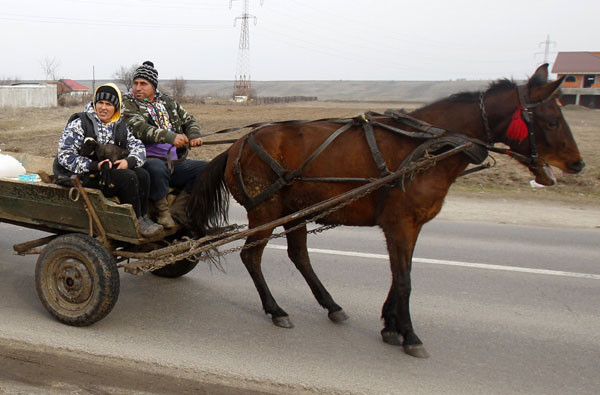Horsemeat crisis sparks calls for DNA food tests
Updated: 2013-02-15 14:25
(China Daily/Agencies)
|
||||||||
The EU's executive called in Europe's law enforcers on Wednesday and urged that DNA food testing be done in all member states to restore consumer confidence amid a widening scandal over horsemeat-tainted processed food.
 |
|
Florin Dumitru, 40, rides his horse-driven cart in Poroschia village, 90 km south of Bucharest, Romania, on Monday. Dumitru says he would sell the horse to the slaughterhouse to be butchered when it can no longer plow or pull a cart. Bogdan Cristel / Reuters |
"We do not know exactly what has gone wrong," British food and environment minister Owen Paterson told reporters after talks in Brussels, amid growing public anger over mislabeled meat products. As he prepared to drive to the headquarters of the Europol law enforcement agency in The Hague, he said: "We have to get to the bottom of these cases."
France and Switzerland have now joined Britain in finding horsemeat in frozen beef lasagne, while supermarket chains in Sweden, the Netherlands and Germany have pulled millions of frozen meals off the shelves.
The row has exposed the complex web of suppliers involved in the food chain, raising public fears about health as well as suspicions of fraud.
British police on Tuesday raided two meat plants in their search for the source of horsemeat found in kebabs and burgers. Paterson warned in Brussels: "This is a criminal conspiracy to defraud the public."
EU Health Commissioner Tonio Borg, who joined eight EU nations at Wednesday's talks, said Brussels was calling on all 27 European Union states to carry out DNA tests on beef products to see if they contained horsemeat.
The European Commission will also urge checks in all European establishments handling raw horsemeat for phenylbutazone, an equine veterinary drug that can be dangerous to humans.
"No one has the right to label as beef something that is not beef," he said following the talks involving Britain, France, Germany, Ireland, Luxembourg, Romania, Poland and Sweden.
"Someone will be held responsible, even criminally responsible," he added.
Irish Minister for Agriculture Simon Coveney, who chaired the meeting, said: "It has become very clear that this is a European problem that has to be dealt with Europe-wide."
Since Britain last week discovered horsemeat in frozen lasagne - made by French firm Comigel and sold under the Findus label - supermarkets across Europe have pulled millions of frozen meals.
In the latest incidents, Switzerland's Coop said it had found horsemeat in its own-brand frozen lasagne produced by Comigel.
Based in northeastern France, Comigel has denied all wrongdoing, saying it bought meat from another French firm, Spanghero, through its own Luxembourg subsidiary. Spanghero said it was supplied by two abattoirs in Romania - which also insist they have done nothing wrong.
Media reports focused on a Dutch trader, Jan Fasen, director of Draap Trading Ltd, who confirmed to Britain's Guardian newspaper that he had bought a consignment of horsemeat from two Romanian abbatoirs and sold it to French food processors but denied mislabeling it.
"We sold it to Spanghero in France as well as to clients in Belgium and Holland. It was all sold as horse. There is no issue," Fasen said.
Agence France-Presse
Related stories:
Ireland moves to quell horsemeat fears
France pledges sanctions in horsemeat scandal
Horsemeat scandal: French retailers recall products

 Li Na on Time cover, makes influential 100 list
Li Na on Time cover, makes influential 100 list
 FBI releases photos of 2 Boston bombings suspects
FBI releases photos of 2 Boston bombings suspects
 World's wackiest hairstyles
World's wackiest hairstyles
 Sandstorms strike Northwest China
Sandstorms strike Northwest China
 Never-seen photos of Madonna on display
Never-seen photos of Madonna on display
 H7N9 outbreak linked to waterfowl migration
H7N9 outbreak linked to waterfowl migration
 Dozens feared dead in Texas plant blast
Dozens feared dead in Texas plant blast
 Venezuelan court rules out manual votes counting
Venezuelan court rules out manual votes counting
Most Viewed
Editor's Picks

|

|

|

|

|

|
Today's Top News
Boston bombing suspect reported cornered on boat
7.0-magnitude quake hits Sichuan
Cross-talk artist helps to spread the word
'Green' awareness levels drop in Beijing
Palace Museum spruces up
First couple on Time's list of most influential
H7N9 flu transmission studied
Trading channels 'need to broaden'
US Weekly

|

|







